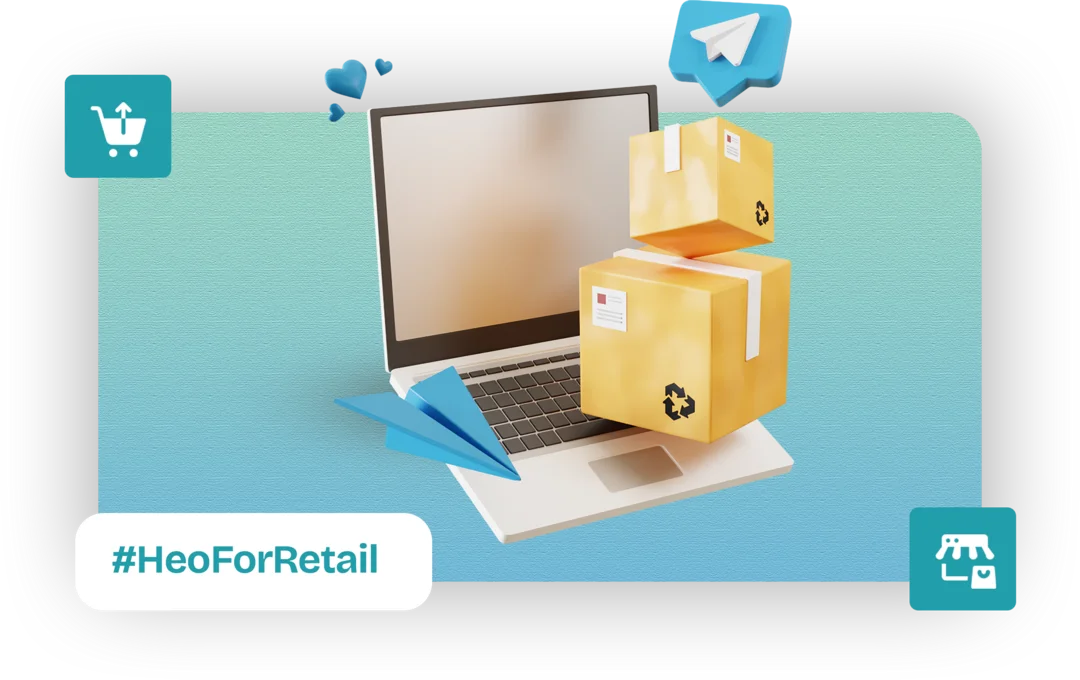Perakende neden videolu eğitim araçlarına ihtiyaç duyar?

Perakende neden videolu eğitim araçlarına ihtiyaç duyar?
Perakende sektörü, sürekli değişen tüketici davranışları, teknolojik yenilikler ve rekabetçi pazar koşulları nedeniyle online eğitim platformlarına büyük bir ihtiyaç duymaktadır. İşte perakende sektörünün online eğitim platformlarına ihtiyaç duymasının bazı nedenleri:
- Sürekli Eğitim ve Güncelleme İhtiyacı
- Ürün Bilgisi ve Yenilikler: Perakende sektöründe çalışanlar, sürekli olarak yeni ürünler ve hizmetler hakkında bilgi sahibi olmalıdır. Online eğitim platformları, çalışanların bu bilgilere hızlı ve kolay erişimini sağlar.
- Teknolojik Değişiklikler: Yeni satış sistemleri, ödeme yöntemleri ve dijital araçlar hakkında sürekli eğitim gereklidir.
- Çalışan Gelişimi ve Motivasyonu
- Profesyonel Gelişim: Perakende çalışanlarının kariyer gelişimi için çeşitli eğitimler alması gereklidir. Bu eğitimler, liderlik, satış teknikleri ve müşteri hizmetleri gibi konularda olabilir.
- Motivasyon ve Katılım: Sürekli eğitim, çalışanların motivasyonunu artırır ve işlerine daha fazla bağlılık göstermelerine yardımcı olur.
- Müşteri Hizmetleri ve Deneyimi
- Müşteri Hizmetleri Eğitimi: Müşteri memnuniyeti, perakende sektörünün en önemli unsurlarından biridir. Çalışanların etkili iletişim, problem çözme ve müşteri ilişkileri yönetimi konularında eğitilmesi gerekir.
- Müşteri Deneyimi İyileştirme: Müşteri deneyimini sürekli olarak iyileştirmek için çalışanların güncel trendler ve en iyi uygulamalar hakkında bilgi sahibi olması önemlidir.
- Yasal ve Düzenleyici Gereklilikler
- Yasal Uyum Eğitimleri: Perakende sektöründe çalışanlar, tüketici hakları, veri koruma ve iş güvenliği gibi yasal gereklilikler konusunda sürekli olarak eğitilmelidir.
- Uyum ve Standartlar: Şirket politikaları ve endüstri standartlarına uyum sağlamak için düzenli eğitimler gereklidir.
- Satış ve Pazarlama Becerilerinin Geliştirilmesi
- Satış Teknikleri ve Stratejileri: Satış performansını artırmak için çalışanların etkili satış teknikleri ve stratejileri konusunda eğitilmesi önemlidir.
- Dijital Pazarlama Eğitimleri: Online satış ve dijital pazarlama stratejileri hakkında bilgi sahibi olmak, perakende çalışanlarının müşteri tabanını genişletmesine yardımcı olur.
- Esneklik ve Ulaşılabilirlik
- Zaman ve Mekan Esnekliği: Online eğitim platformları, çalışanların kendi programlarına uygun olarak eğitim almalarını sağlar, böylece iş-yaşam dengesi korunur.
- Geniş Erişim: Farklı şubelerde çalışan tüm personelin aynı eğitimlere erişebilmesi, eğitim standartlarını yükseltir ve tutarlılığı sağlar.
- Performans Takibi ve Değerlendirme
- İzleme ve Raporlama: Online eğitim platformları, eğitimlerin etkinliğini izleme ve değerlendirme imkanı sunar. Çalışanların ilerlemesi ve eğitim ihtiyaçları kolayca takip edilebilir.
- Kişiselleştirilmiş Eğitimler: Çalışanların ihtiyaçlarına göre özelleştirilmiş eğitim programları sunulabilir, bu da daha etkili bir öğrenme deneyimi sağlar.
- Rekabet Avantajı
- Yenilikçi Eğitim Programları: Rakiplerin önüne geçmek için yenilikçi ve güncel eğitim programları sunmak önemlidir.
- Hızlı Adaptasyon: Pazar değişikliklerine ve yeni trendlere hızlı bir şekilde uyum sağlamak, rekabet avantajı elde etmeyi sağlar.
Perakende sektörü, Heocademy gibi online eğitim platformları aracılığıyla yukarıda belirtilen tüm bu avantajlardan faydalanabilir. Bu platformlar, çalışanların bilgi ve becerilerini sürekli olarak güncellemelerine, müşteri memnuniyetini artırmalarına ve sektördeki değişimlere hızlı bir şekilde uyum sağlamalarına yardımcı olur.
Heocademy Perakende sektörüne neler katar?
Heocademy’nin özellikleri, perakende sektöründe çeşitli ihtiyaçları karşılayarak işletmelere ve çalışanlara önemli avantajlar sağlar. İşte Heocademy’nin özelliklerinin perakende sektörü için nasıl kullanılabileceğine dair detaylı açıklamalar:
- İstediğin Zaman İstediğin Yerde Eğitim Platformunu Kullan
Perakende sektöründeki çalışanlar, mağaza içinde veya dışında herhangi bir zamanda ve herhangi bir cihazdan eğitimlere erişebilirler. Bu esneklik, çalışanların iş saatleri dışında bile kendilerini geliştirmelerine olanak tanır.
- Sitende Pazarlama ve Reklam Yap
Perakende şirketleri, Heocademy platformunu kullanarak web sitelerine Facebook Pixel ve Google Tag Manager gibi izleme araçlarını entegre edebilir. Bu, kullanıcı etkileşimlerini ve trafiği izleyerek pazarlama stratejilerini optimize etmelerine yardımcı olur. Kuponlar ve affiliate pazarlama stratejileri kullanarak satışlarını artırabilirler.
- Kod Bilmene Gerek Yok
Kolay Yönetim Paneli ile perakende sektöründe çalışan eğitim yöneticileri, karmaşık kodlama bilgisine ihtiyaç duymadan eğitim videolarını, ders materyallerini ve dijital ürünlerini yönetebilirler. Bu sayede eğitim materyallerini kolayca paylaşabilir ve çalışanlarının performansını izleyebilirler.
- Tam Entegre E-Commerce Altyapısı (Heocommerce)
Perakende işletmeleri, İyzico, PayPal, banka havaleleri ve EFT gibi çeşitli ödeme yöntemlerini kullanarak online mağazalarında satış yapabilirler. Bu esneklik, müşterilere farklı ödeme seçenekleri sunarak satışları artırır.
- Etkinlik Düzenleyici
Perakende sektöründe çeşitli etkinlikler düzenlemek ve yönetmek için Heocademy’nin etkinlik düzenleyici özelliği kullanılabilir. WhatsApp üzerinden hatırlatma mesajları göndererek katılımcıların etkinliklere zamanında katılmalarını sağlamak mümkündür.
- Destek
Kapsamlı destek ekibi, perakende sektöründeki kullanıcıların her türlü sorununu çözmeye yardımcı olur. Eğitim platformunu kullanırken karşılaşabilecekleri sorunlarda destek sağlar.
- Quiz Özelliği
Çalışanların eğitim videolarını izledikten sonra quizler çözmeleri, öğrenme seviyelerini ölçmelerine yardımcı olur. Bu quizler ile perakende çalışanlarının bilgi düzeyi değerlendirilerek başarı sertifikası verilebilir.
- Online Ödeme Özelliği
Perakende sektöründe online ödeme seçeneklerini kullanarak ödeme süreçlerini yönetebilirler. Bu, mağaza dışı eğitim ve ürün satışlarında kolaylık sağlar.
- Özel Alan Adı
Perakende işletmeleri, Heocademy platformunu kendi belirledikleri alan adıyla kişiselleştirerek markalarının görünürlüğünü artırabilirler.
- Whatsapp Hatırlatma Özelliği
Canlı dersler veya etkinlikler için WhatsApp üzerinden hatırlatma mesajları göndererek çalışanların zamanında katılımını sağlamak mümkündür.
- E-Ürün Özelliği
PDF formatında dijital ürünler (e-bilet, e-kitap, resimler, öğretim materyalleri vb.) sisteme yüklenerek satışa sunulabilir. Bu, perakende sektöründeki eğitim materyallerinin kolayca dağıtılmasını sağlar.
- Blog Özelliği
Perakende sektöründe eğitim platformuna ekleyecekleri blog sayfası aracılığıyla eğitim materyalleri ve sektörle ilgili yazıları paylaşabilirler. Bu, çalışanların sürekli güncel kalmasını sağlar.
- E-Randevu Özelliği
Perakende işletmeleri, çalışanları veya müşterileri ile bireysel veya grup seansları planlamak için e-randevu özelliğini kullanabilirler. Bu, eğitim ve danışmanlık süreçlerini daha düzenli hale getirir.
- Canlı Eğitim Yönetimi
Canlı ve interaktif eğitimler organize ederek, bu eğitimleri satışa sunabilir ve kaydederek katılımcıların daha sonra erişimlerini sağlayabilirler.
- Videolu Eğitim Özelliği
Video formatında eğitim içerikleri sunarak çalışanlara sertifika imkanı sunabilirler. Bu içerikleri kurumlara ve öğrenci gruplarına özel olarak sınıflandırarak daha hedefli eğitimler verebilirler.
- Ödev & Doküman
Eğitim içeriklerini kaynaklar ve ödevlerle zenginleştirerek, çalışanların gelişimini destekleyebilirler. Bu sayede eğitim süreci daha interaktif hale gelir.
- LMS Özelliği
Öğrencilerin hangi videoyu ne kadar izlediği, sertifika hak edişi, performans değerlendirmeleri gibi verileri takip edebilirler. Bu, perakende sektöründe çalışanların eğitim performansını izlemeyi ve geliştirmeyi sağlar.
Bu özellikler, perakende sektörünün eğitim ihtiyaçlarını karşılamada Heocademy platformunun ne kadar etkili olduğunu gösterir. Çalışanların bilgi düzeyini artırmak, müşteri memnuniyetini sağlamak ve iş süreçlerini optimize etmek için Heocademy’nin sunduğu çözümler büyük bir avantaj sunar.
Perakende sektörü hangi konularda eğitim oluşturulabilir?
Perakende sektörü, çalışanlarını eğitmek ve geliştirmek amacıyla geniş bir yelpazede konulu video eğitimler sağlayabilir. İşte perakende sektöründe sağlanabilecek bazı video eğitim konuları:
- Müşteri Hizmetleri
- Müşteri İlişkileri Yönetimi: Müşteri memnuniyetini artırmak için etkili iletişim teknikleri.
- Zor Müşterilerle Başa Çıkma: Zor durumlarla başa çıkma stratejileri ve müşteri şikayetlerini yönetme.
- Satış Teknikleri
- Satış Stratejileri ve Taktikleri: Etkili satış teknikleri, ürün sunumu ve ikna yöntemleri.
- Up-Sell ve Cross-Sell Teknikleri: Müşterilere daha fazla ürün satma ve çapraz satış stratejileri.
- Ürün Bilgisi
- Ürün Eğitimleri: Mağazada satılan ürünlerin özellikleri, faydaları ve kullanım talimatları hakkında detaylı bilgi.
- Yeni Ürün Tanıtımı: Yeni ürünlerin lansmanı ve çalışanların bu ürünler hakkında bilgilendirilmesi.
- Stok Yönetimi
- Stok Kontrolü ve Takibi: Stok yönetimi, envanter kontrolü ve yeniden sipariş süreçleri.
- Depo Yönetimi: Depo düzeni, ürün yerleştirme ve envanter yönetimi.
- Görsel Mağazacılık
- Mağaza Düzeni ve Vitrin Tasarımı: Etkili mağaza düzenleme teknikleri ve çekici vitrin tasarımı.
- Merchandising: Ürün yerleştirme, sergileme teknikleri ve mağaza içi görsel unsurların kullanımı.
- Kasa İşlemleri
- Kasa Yönetimi ve İşlemleri: Kasa kullanımı, ödeme kabulü ve iade işlemleri.
- Kasa Güvenliği: Kasa güvenlik önlemleri ve dolandırıcılıkla mücadele.
- İş Sağlığı ve Güvenliği
- Mağaza İçinde Güvenlik: Çalışanların ve müşterilerin güvenliğini sağlama yöntemleri.
- Acil Durum Prosedürleri: Yangın, deprem gibi acil durumlar için tahliye ve güvenlik prosedürleri.
- Müşteri Deneyimi
- Müşteri Yolculuğu: Müşterinin mağazaya girişinden çıkışına kadar olan sürecin yönetimi.
- Müşteri Sadakati Programları: Sadakat programlarının oluşturulması ve yönetimi.
- Dijital Dönüşüm
- E-Ticaret ve Omnichannel Stratejileri: Online satış kanalları ve mağaza içi dijital çözümler.
- Dijital Pazarlama: Sosyal medya, e-posta pazarlama ve dijital reklamcılık stratejileri.
- Liderlik ve Yönetim
- Mağaza Yöneticisi Eğitimi: Mağaza yönetimi, liderlik ve takım yönetimi.
- Performans Değerlendirme ve Geri Bildirim: Çalışan performansını değerlendirme ve yapıcı geri bildirim verme.
- Hukuki ve Etik Eğitimler
- Perakende Sektöründe Hukuki Düzenlemeler: Tüketici hakları, garanti ve iade politikaları.
- İş Etiği ve Profesyonel Davranışlar: İş etiği kuralları, profesyonel davranışlar ve etik dilemmanın yönetimi.
Bu eğitim konuları, perakende sektöründeki çalışanların bilgi ve becerilerini artırarak, müşteri memnuniyetini ve işletme verimliliğini arttırmaya yönelik kapsamlı bir eğitim programı oluşturur.
Şirketine Özel Çözümler için Hemen Formu Doldur, Seni Arayalım.



 Tr
Tr